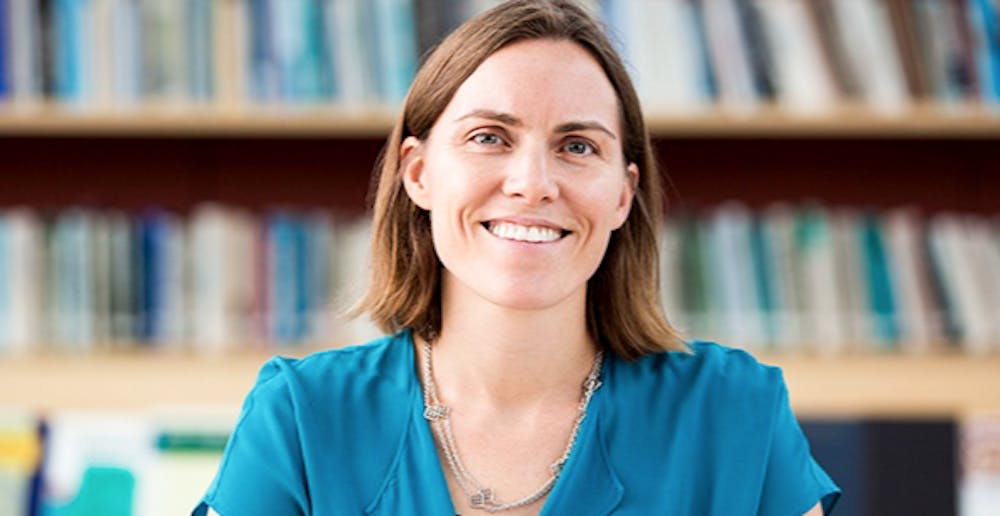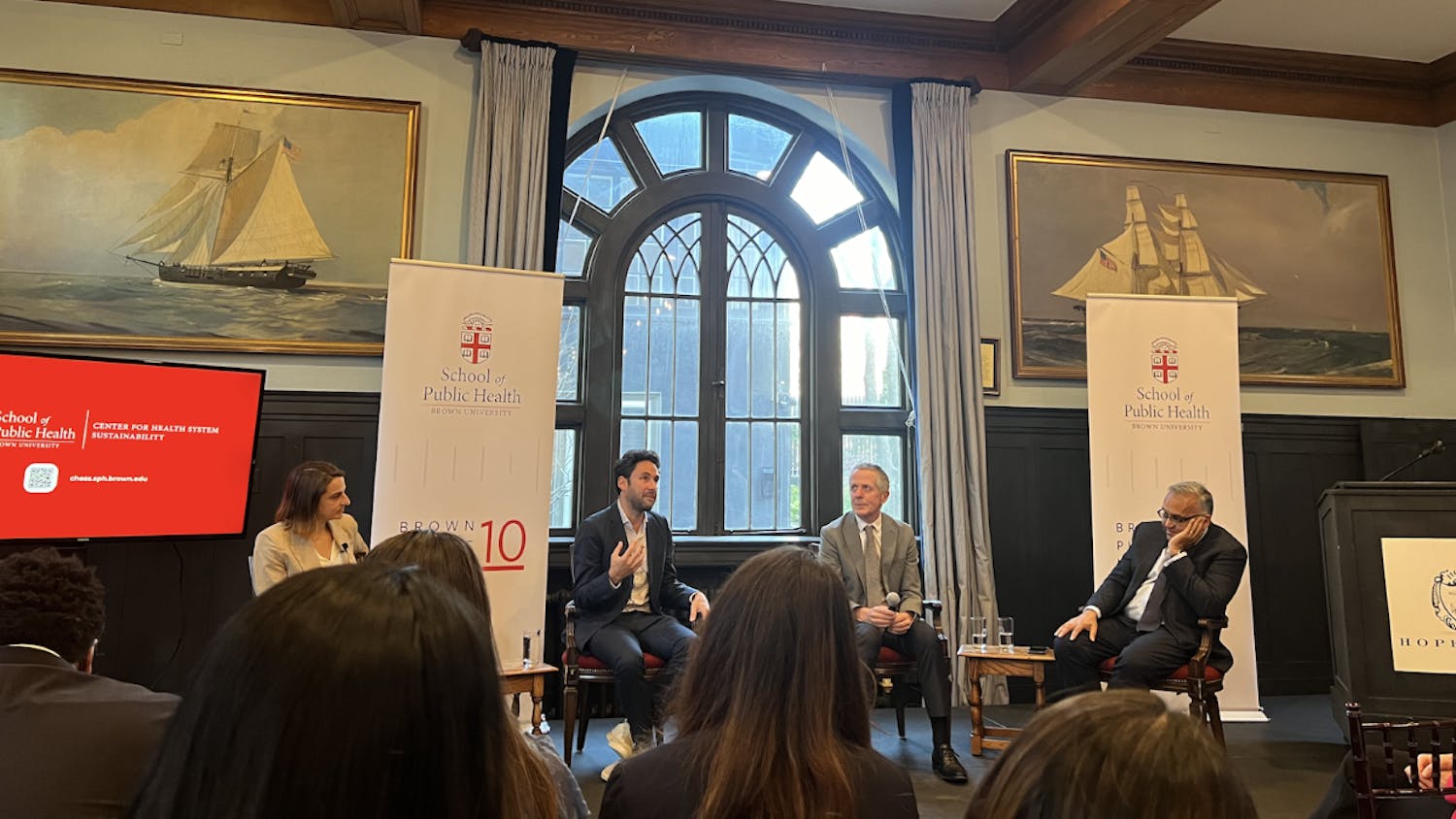During the uniquely anxious months of pregnancy and early years of parenthood, many turn to Professor of Economics Emily Oster’s data-based books.
They ask themselves, “What would Emily do?”
Oster has become a household name for “Expecting Better” and “Cribsheet,” which mix data synthesis and personal stories to offer unconventional prenatal and parenting advice.
“It’s a weird thing to have, to be a person who thinks of themselves as just sitting in their office making graphs, writing papers, and then to have people think of you as someone who is in their life,” Oster said in an interview with The Herald. “It’s a privilege.”
Both of Oster’s parents are economists at Yale, but she wasn’t always set on joining the “family business.” Yet economics continues to run in her family — her husband, Jesse Shapiro, is also a professor of economics at the University.
An“ill-fated summer” spent in a fruit fly lab early in her undergraduate career turned Oster away from wet lab biology research. Though she entered college set on studying a hard science, she shifted her focus to economics from that point on. Despite her personal distaste for the lab experience, it set her up to pursue her long-held interest in the ability to “create new knowledge.”
Oster is a health economist — focusing on decision-making, causality and other economic principles in relation to medicine and healthcare systems. Throughout her career, Oster has forged interdisciplinary relationships with medical professionals. For example, she studied Huntington’s disease and genetic testing alongside neurologists. In writing her popular books, she partnered with an obstetrician for her first book and a pediatrician for her second. Recently, she has been doing�� academic work on “biases in observational data that are created by recommendations.”
Oster’s first book, “Expecting Better,” was released in 2013. During her first pregnancy, she set out to make sense of the common rules that pregnant women often follow, but rarely question. New York Times bestseller “Cribsheet,” released this year, has a similar premise, and it essentially picks up where “Expecting Better” left off — in the delivery room. At the end of “Cribsheet’s" introduction, Oster writes, “The goal of this book is not to fight against any particular piece of advice, but against the idea of not explaining why.”
Since 2013, “Expecting Better” has only become more popular. “More people started reading it. … People liked it and passed it to their friends,” she said.
The book’s popularity was again reborn when then-pregnant stand-up comedian Amy Schumer endorsed “Expecting Better” a few months before “Cribsheet” was set to be released. In an Instagram post in April, Schumer wrote that Oster “got (her) through pregnancy.” She later interviewed Oster on her Spotify podcast, where she thanked “Expecting Better” for “shining a light on the truth.”
“You can’t pay for that kind of publicity,” Oster said.
Schumer is not the only new mother to find solace in Oster’s books. Both books are considered relatable and informative — they allow for meditation on facts alongside Oster’s personal, sometimes comedic, anecdotes about her life, pregnancies and experience raising her children. Schumer called Oster “the non-judgmental girlfriend holding our hand and guiding us through pregnancy and motherhood.”
“Cribsheet” covers a wide range of topics about childbirth and child-rearing — from breastfeeding to vaccinations, language development, potty training and the general stresses of parenting, among many others. “A fairly large number of (the topics) were things I thought about or struggled with when I had my kids.” She also worked with focus groups to determine what else parents were wondering.
“I do a lot of research … thinking about my parenting in a way that is informative about the books and that is informative of my own experiences.” Today, her two children are past the preschool-age scope of “Cribsheet.” “I’m now lost. I just do whatever,” Oster joked.
As she was experiencing pregnancy for the first time while writing “Expecting Better,” Oster was just as surprised by some of her claims as her readers were. For example, on the topic of bed rest, she had initially thought, “maybe it wasn’t always a good idea, but it was often a good idea.” Instead, she found that “it is more or less never a good idea,” and her review of present data challenged a long-held medical convention. Research for “Cribsheet” didn’t bring about as many shocking twists, Oster said, because parenting advice is usually less prescriptive.
Although her books are both based on existing research, Oster relied on her own health economics background to make sense of the material and weave the data together in a way that made it both colloquial and academically rigorous. In terms of doing research for her books, “there’s … a little piece of creating new knowledge,” Oster said. “But I think a lot of what is challenging about that is … that I’m trying to think about how to synthesize that knowledge in a way that lets people engage with it and understand it.”
Oster has been able to interact with her readers through events and through social media platforms like Twitter, where she goes by @ProfEmilyOster. “There’s definitely an Econ Twitter … world. I think it’s actually a super interesting way to think about getting research out there,” she said. Oster uses Twitter to meld her different lives together. “It’s sort of uncurated,” she said. Her profile’s feed is composed of tweets about her children, her academic papers, economic principles in general — and all of those fragments help her formulate connections with others in her field or fans of her books.
Oster is already well-connected in the academic world of applied economics. In mid-October, it was announced that her graduate school thesis advisor, Michael Kremer, an economist and professor of developing societies at Harvard, won the Nobel Prize in Economics.
“When your graduate school advisor wins a Nobel prize, that’s awesome,” she said. Oster worked for Kremer before she officially started grad school, and that winter he asked her to spend a few days over Christmas drafting a paper on a tight deadline.�� “I got a chance to do that, and (now) that paper is cited in the Nobel Citation.”
Beyond educating the public, Oster has taught a variety of courses at Brown, and will be teaching a new course in spring 2020 called ECON 1430: “The Economics of Social Policy.”
Oster recommends that students engage in research. “There is this sort of special moment in research, where you kind of know something, or you see an insight or make a connection that no one has made before.”




